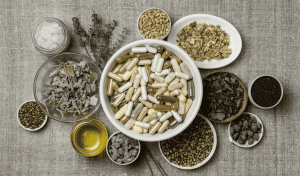Understanding the Brain-Gut Connection
Everyone eats to live. Our bodies rely on the nutrients from food to carry out essential physiological functions, such as energy production and immune response. Digestion, the intricate process of breaking down food into its basic components for absorption, is a complex interplay of mechanical and biochemical processes. However, problems related to digestion can disrupt this process, leading to various symptoms and even severe diseases. Unfortunately, the prevalence of digestive issues is on the rise in Canada, affecting millions of individuals. In this article series, “Take Control of Your Digestion,” we aim to shed light on the digestive process, explore the problems associated with it, and provide recommendations to alleviate symptoms.
The Brain: The Master Organ of Digestion
Contrary to popular belief, digestion begins in the brain, not in the stomach or intestines. The brain, specifically the hypothalamus, plays a crucial role in coordinating every step of digestion and ensuring optimal absorption of nutrients. The hypothalamus receives input from the senses and regulates the body’s hunger response based on its energetic demands. It also controls other vital functions such as arterial pressure and body temperature. Understanding the link between the digestive system and the nervous system is of utmost importance for overall human health.
The Experiential Experience of Eating
Cooking a meal initiates a cascade of events in the brain. The hypothalamus receives sensory data from the five senses, providing information about the external and internal environment of the body. This sensory input influences the body’s hunger response and sets the stage for optimal nutrient absorption. As the anticipation of a meal increases, digestive juices are released, saliva production is stimulated, and the stomach secretes hydrochloric acid to break down nutrients. The pancreas prepares enzymes to further break down the food. The entire process is orchestrated by the brain through the vagal nerve, which acts as the primary communication line between the digestive system and the brain.
Stress and Digestion
Stress can significantly impact digestion. When the body is stressed, its internal alert system activates, diverting resources away from the digestive process. Digesting a meal becomes a secondary priority as the body focuses on dealing with perceived danger. This can lead to inefficient nutrient absorption and favor the use of quick sources of energy like sugar. It is crucial to recognize the impact of stress on digestion and address it for improved digestive health.
Taking Control of Digestion
To improve digestive health, it is essential to consider the state of the body before food enters the system. Identifying sources of stress and finding ways to manage them is crucial. Taking an inventory of stress factors allows for targeted solutions and proactive changes. Additionally, being mindful of the sensory experience of meals and consciously cooking one’s food can enhance the overall digestive process. Engaging all five senses while cooking and eating can stimulate the brain and optimize nutrient absorption.
Conclusion
Understanding the brain-gut connection is key to taking control of your digestion. The brain regulates the entire digestive process, from the anticipation of a meal to nutrient absorption. Managing stress and being mindful of the sensory experience of meals can significantly impact digestive health. By consciously cooking and engaging all five senses, you can optimize nutrient absorption and promote overall well-being. Remember, a healthy digestive system is essential for a healthy life.
- Cancer.ca – Statistics on Digestive Health: http://www.cancer.ca/en/cancer-information/cancer-type/stomach/statistics/?region=on
- National Institute of Science – Role of Gustatory Cells: https://www.ncbi.nlm.nih.gov/pubmed/23165087
- Study on the Nervous System’s Presence in Digestion: https://www.ncbi.nlm.nih.gov/pmc/articles/PMC2680194/
- Impact of Diet on Nutrient Absorption: https://www.ncbi.nlm.nih.gov/pubmed/20410248





